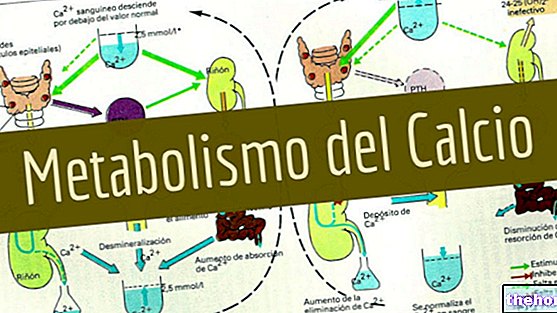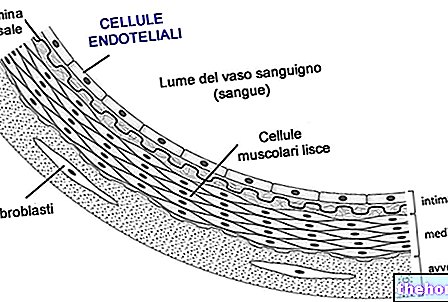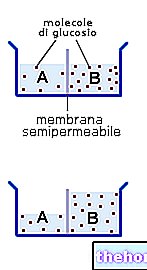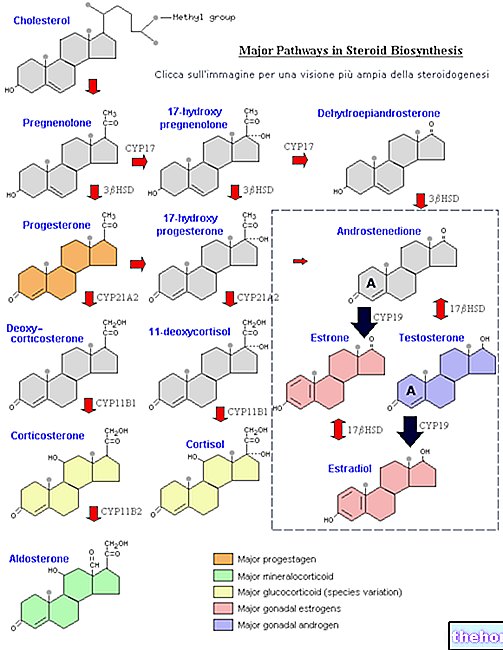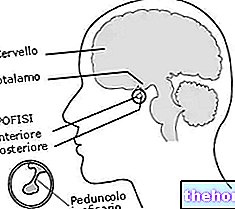Unlike other endocrine glands, the thyroid contains abundant hormonal reserves, so that the daily fluctuations in iodine intake do not cause major alterations in its functionality. However, it is important not to underestimate the role of this mineral in daily nutrition, especially during pregnancy. , a period in which a possible deficiency could cause abortion or rather serious mental deficiencies (cretinism) during the development of the fetus. The consumption of so-called "goitigenic" foods (because they are capable of sequestering the iodine taken from the diet) is not of particular clinical interest , except in those rare cases in which the dietary intake of iodine is particularly low (an eventuality avoided by the simple consumption of iodized salt). For the same reason, there is no convincing evidence that the consumption of soy and its isoflavones can slow down thyroid function. The recommended intake doses for the Italian population are 150 mcg of iodine per day and, for women, 200 mcg / day during breastfeeding and 175 mcg / day during pregnancy.
Once produced, the thyroid hormones can be directly conveyed into the bloodstream or deposited in the colloid of the thyroid follicles; the latter are spherical structures with a central cavity filled with a dense glycoprotein material, called colloid. Inside we find large quantities of thyroglobulin, a rather complex protein, with numerous tyrosine residues, which constitutes the storage form of T3 and T4. At the moment of need, a specific enzyme intervenes which, inside the follicle, frees the thyroid hormones from their binding with thyroglobulin, as happens, for example, in response to the stimulating action of TSH.
The colloid constitutes a reserve of thyroid hormones sufficient for 2-3 months.
The hormonal molecules secreted by thyrocytes (or thyroid cells) are mainly made up of thyroxine and only a small part of triiodothyronine; however, it is this last hormone that plays a major role in cell physiology. It should also be emphasized that most of the circulating T3 is not of thyroid origin, but derives from the peripheral monodeiodation of T4, which occurs mainly in the liver; T4 can therefore be considered a kind of prohormone.
The transport of the hormones produced by the thyroid into the bloodstream is mediated by specific plasma proteins, such as TBG and albumin; only the small amount of T3 and T4 that escapes this link is metabolically active.

As the name implies, TSH, produced by the anterior lobe of the pituitary gland or pituitary gland, is released when the levels of thyroid hormones in the blood are lowered. Once secreted, TSH stimulates the thyroid to incorporate more iodine, to synthesize more thyroid hormones and release them into the circulation. On the contrary, when the levels of T3 and T4 rise, the secretion of the hormone is inhibited according to a reaction known as "negative feedback". This complex regulatory mechanism allows to maintain a hormonal balance adequate to the needs of the organism. Our body, in practice, follows the function of the thermostat of a boiler: when the water temperature drops below a limit value, the burner switches it switches on and heats the liquid until, once a pre-set maximum temperature has been reached, it is automatically switched off.
The comparison with the boiler is not at all casual; the hormones produced by the thyroid are in fact an important stimulus for the metabolic activity of the tissues, an action made particularly evident by the typical phenotype of hyperthyroid subjects (accentuated thinness, profuse sweating, intolerance to high temperatures, warm and thin skin, slender body and a characteristic protrusion of the eyeballs). A "thyroid hyperfunction, contained within the physiological limits, causes an increase in body metabolism and promotes weight loss. For this reason we find iodine in many synthetic slimming products (the so-called fat burners) or natural (fucus, laminaria); some athletes or unscrupulous doctors even take / prescribe thyroid hormones or their precursors, with the sole purpose of improving physical appearance (see bodybuilder) or athletic performance. However, this is a very dangerous practice due to the possible onset of chronic thyroid dysfunction. In any case, once the intake is over, there will still be a temporary slowdown of all bodily functions due to the "negative feedback" described a few lines ago.
Other articles on "Thyroid and hormones, thyroid functions"
- Thyroid
- Diseases of the thyroid gland
- Thyroid hormones
- Actions of thyroid hormones: thyroxine and triiodothyronine
- Thyroid hormones T3 - T4 and exercise
- Gozzigeni foods
- Hypothyroidism
- Hyperthyroidism
- Triacana

